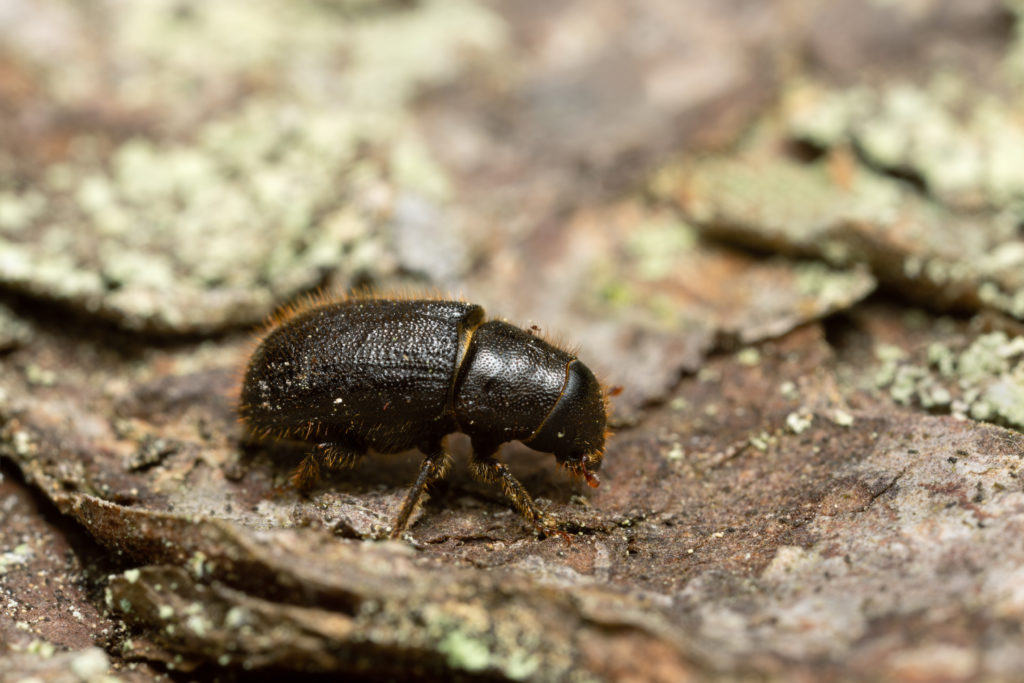NEW restrictions have been imposed in Scotland on the export of timber to Ireland to stop the spread of a pest which can be deadly for trees.
Scottish Forestry has confirmed it has been working closely with governments in Northern Ireland and in the Republic to bring in measures which will “reduce the risks posed by the great spruce bark beetle, Dendroctonus micans”.
The pest, which has been found in Scotland, targets spruce and pine trees by tunnelling into their bark and laying eggs underneath it.
The larvae which emerge from the eggs feed on the inner woody layers, which weakens, and in some cases can kill, the tree.
Great spruce bark beetles have yet to be found in Ireland or Northern Ireland.
Scotland’s new restrictions are designed to maintain Ireland’s pest-free status, while continuing the export of Scottish timber to the nation.
Currently the only timber exported to Ireland comes from the west of Scotland’s Pest Free Area (PFA).
New restrictions will see a 35km buffer zone put in place around findings of the Dendroctonus micans (D. micans) bark beetle.
Under the new measures spruce timber moving from Scotland to Ireland will only be allowed to travel through the buffer zone between October 1 and March 31, which is outside of the beetle’s flying season.
Also during this period the timber should not be stored in the buffer zone but can be loaded at ports.
 The great spruce bark beetle, Dendroctonus micans, targets spruce and pine trees by tunnelling into their bark and laying eggs underneath it
The great spruce bark beetle, Dendroctonus micans, targets spruce and pine trees by tunnelling into their bark and laying eggs underneath itScottish Forestry has also stated that phytosanitary (plant export) certificates confirming that conifer timber is free from D. micans will not be issued within 35km of a beetle finding.
“Both the West of Scotland and island of Ireland have pest free status for D. micans and a number of other bark beetles,” James Nott, Head of Tree Health at Scottish Forestry, said.
“It is important that we are both able to maintain this status which has been in place for many years as it allows trade to continue.”
He added: “In Scotland, the D. micans bark beetle is getting gradually closer to the PFA boundary.
“Although no beetles have been found within the PFA it is no longer possible to guarantee freedom from this beetle in all areas.
“As a precautionary measure, to maintain the integrity of the rest of the west of Scotland PFA, it is necessary to introduce measures to mitigate the risk.
“This action will enable trade from the rest of the PFA to continue.
"However, if the beetles continue to spread, the longer-term prospect is for the area of the west of Scotland PFA to reduce and ultimately close.”
Ireland’s Minister of State for Agriculture, Senator Pippa Hackett, has welcomed the news.
“My department has worked closely over a number of months with the Scottish authorities to arrive at an outcome that will protect Irish forests, so these new restrictions on the movement of spruce logs from some of the west of Scotland’s Pest Free Area are a positive step in maintaining Ireland’s protected zone status for certain forestry pests,” she said.
She added: “My department has had detailed discussions on these new measures with its Scottish counterparts, with the overall aim of ensuring that the integrity of the Pest Free Area is maintained and that Irish forests are protected.”
The minister was clear that the bark beetle situation in Scotland remains a “concern” for Ireland.
“The presence of Dendroctonous micans in Scotland is a real concern,” she said.
“My department’s priority has been to ensure that any imports are pest free, so now is an appropriate time to take these additional steps and to reduce the area within the Scottish PFA from which logs can be exported to Ireland.”
Minister Haackett added: “I am supportive of the steps taken by Scottish Forestry with the input of my officials.
“The new measures will ensure that no further phytosanitary certificates will be issued for the movement of spruce roundwood to the island of Ireland originating from any area inside the PFA that falls within a 35km buffer zone imposed around the most recent findings of D. micans.
“This is a significant step. My department will continue to closely monitor the situation in Scotland and take all the steps necessary to ensure that Irish forestry is protected.”

